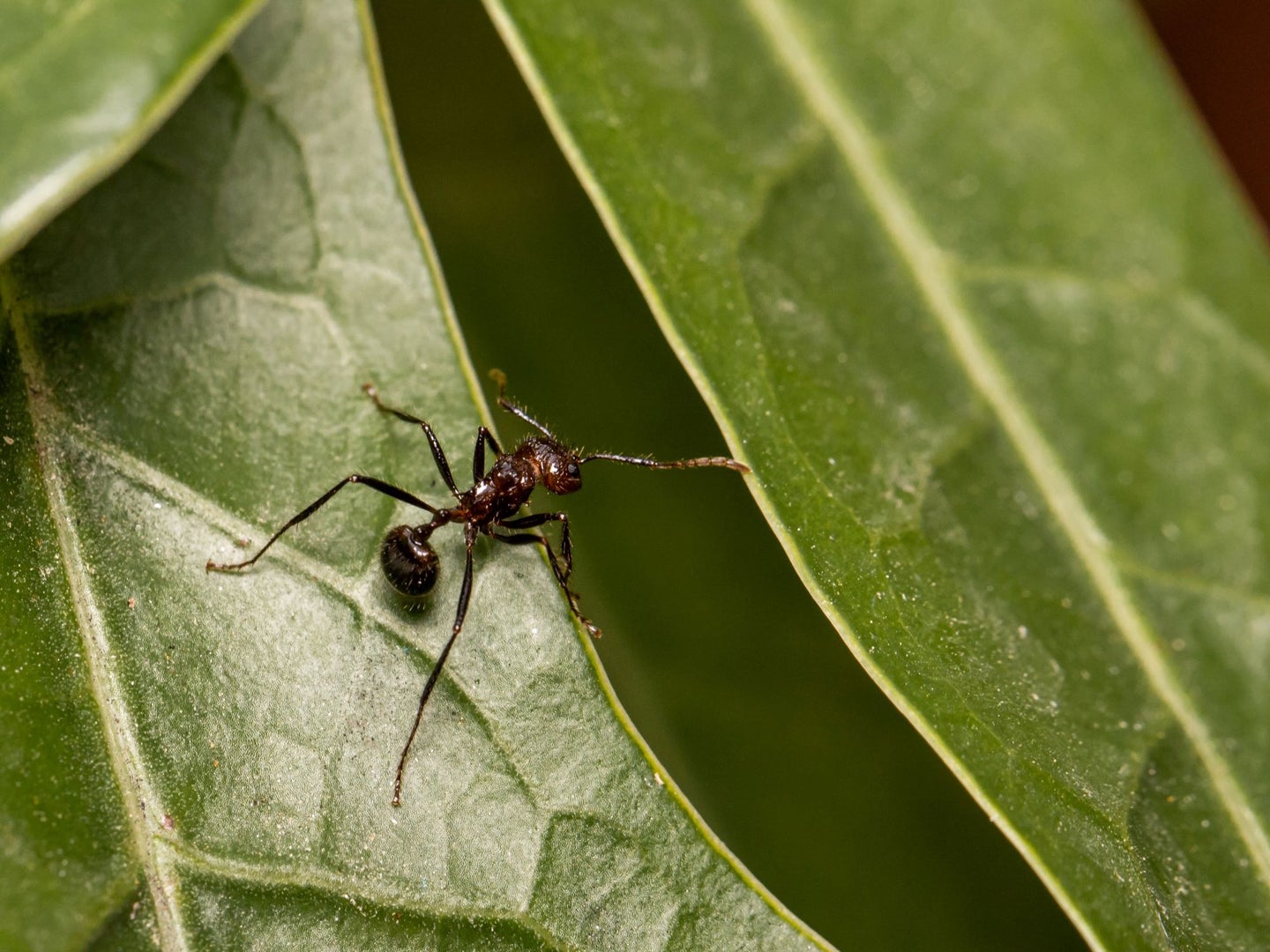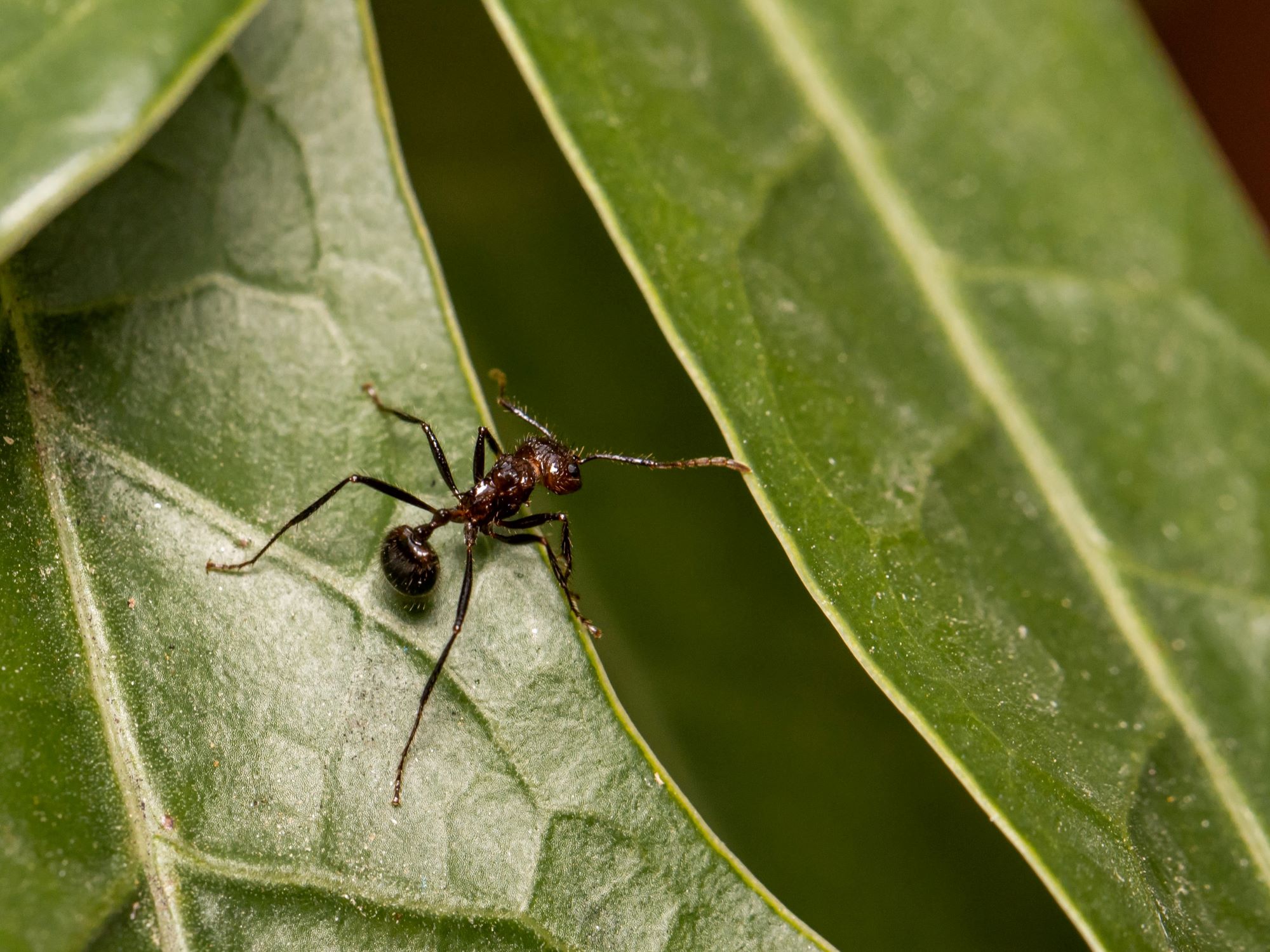Ants produce a chemical compound similar to the one emitted by rotting food, giving off a unique, pungent smell when crushed or killed. This distinctive odor is often likened to that of rotten coconuts, earning the ants the nickname “coconut ants.”
Ants are fascinating creatures known for their strong work ethic and high level of organization. However, one aspect of ants that can catch people’s attention is the peculiar odor they emit when crushed or threatened. The smell is often described as similar to that of rotten coconuts, and it is a common phenomenon associated with a specific type of ant.
Understanding why ant blood smells weird can provide valuable insights into the behavior and chemical composition of these remarkable insects.
The Science Behind Ants’ Unique Smell
Ant blood emits a unique smell due to chemical compounds resembling those from rotting food. When crushed, house ants release a distinct ‘rotten coconut’ scent, a result of methyl ketones. This odor serves as a defense mechanism and can attract more ants to the scene.
Ants are small insects that are known for their fascinating ability to release a unique smell, especially when they are squished or crushed. This distinct scent is often described as resembling rotten coconuts or even blue cheese. But have you ever wondered why ants’ blood smells weird? Let’s dive into the science behind this intriguing phenomenon.Chemical Compounds Released By Ants
The unusual smell emitted by ants is caused by the release of specific chemical compounds. One such compound is methyl ketones, which are responsible for the distinctive odor when ants are crushed. Interestingly, these compounds are also produced by the penicillin mold that grows on rotting coconuts, giving blue cheese its pungent aroma! This similarity in chemical composition may explain why ants’ smell is reminiscent of these foods.The release of methyl ketones by ants serves as a form of chemical communication within their colonies. It is believed that this scent helps ants identify individuals within their group, recognize potential dangers, and navigate their surroundings effectively.Comparison To Rotting Food Odors
At first glance, the smell of ants may seem quite similar to that of rotting food. However, it is important to note that while the odor may be reminiscent, the chemical compounds released by ants are different from those produced by decaying organic matter.Ants’ unique smell is not indicative of decomposition but rather serves as a means of communication and identification within their colonies. The presence of methyl ketones in ants’ blood is a distinguishing feature that sets their scent apart from typical rotting food odors.In conclusion, the distinctive smell emitted by ants when they are squished or crushed can be attributed to the release of specific chemical compounds, namely methyl ketones. This scent serves as a means of communication and identification within ant colonies, allowing them to navigate their environments and recognize potential dangers. So, next time you encounter the unique smell of ants, you’ll know that it’s not just the odor of rotting food, but a fascinating aspect of their biology and social behavior.Understanding The Specific Odor Perception Of Ants
Ant blood may have a weird smell when ants are killed because they release a chemical compound similar to the odor of rotting food or penicillin mold. This unique odor perception of ants is due to the presence of methyl ketones, which also give blue cheese its distinctive aroma.
Formic Acid As The Source Of The Odor
` Ants emit a distinct odor when threatened or crushed, which can be attributed to the presence of formic acid in their bodies. This acid, produced in the poison gland of ants, is used as a defense mechanism against predators and serves as the primary contributor to the unmistakable odor released when ants are disturbed. The secretion of formic acid is a natural response for certain ant species when they feel threatened, and it is the key factor behind the peculiar smell associated with ants.`Variability In Humans’ Ability To Smell Ants
` Humans’ ability to perceive the smell of ants can vary, as not everyone is equally sensitive to the scent. The detection and interpretation of odors can differ due to variations in individual olfactory sensitivity. While some individuals might easily discern the odor, others might not notice it as prominently. This variability in olfactory perception contributes to the differing experiences people have when encountering the distinct smell emitted by ants.Understanding the specific odor perception of ants can provide valuable insight into the chemical processes and sensitivities involved, shedding light on the intriguing nature of these tiny but fascinating creatures.Exploring The Connection Between Ant Behavior And Smell
Ants are remarkable creatures that exhibit complex behaviors and communication systems, often relying on the secretion of pheromones to convey information. The intriguing aspect of ant behavior and smell lies in the defensive mechanisms and communication methods they employ, giving rise to the unique scent associated with ant blood. Let’s delve into the intricate relationship between ant behavior and smell to unravel this fascinating phenomenon.
Ant Defense Mechanisms
When threatened or crushed, ants have evolved various defense mechanisms to protect themselves. One common defensive tactic exhibited by ants is the release of a distinct odor, which can be attributed to their potent chemical compounds. This defensive scent serves as a warning signal to other ants, alerting them to potential danger nearby. The release of this odor is a crucial survival strategy for ants, as it helps to ward off perceived threats and safeguard the integrity of their colony.
Communication Through Pheromones
Ants rely heavily on chemical cues, known as pheromones, to communicate and coordinate their activities within the colony. By emitting specific pheromones, ants can convey important messages such as trail marking, food location, and alarm signals to their fellow colony members. The intricate interplay of pheromones serves as a sophisticated means of communication, allowing ants to navigate their environment effectively and convey vital information to their peers.

Credit: www.popsci.com
Investigating The Impact Of Ant Smells On Other Ants
Research into the impact of ant smells on other ants reveals intriguing insights into the strange odor of ant blood. The unique scent is produced by chemicals emitted when ants are squashed, sparking interest in understanding how this affects ant behavior and communication within colonies.
Significance Of Oleic Acid Release
When an ant is squished or in danger, it releases a chemical compound called oleic acid. This acid is responsible for the weird smell that we experience when we encounter ants. But what is the significance of this release? Why do ants emit oleic acid when faced with danger? It turns out that this pungent odor serves as a communication tool among ants.Oleic acid is not just any ordinary chemical compound. It acts as a pheromone that carries important messages to other ants in the colony. When an ant is in danger or has died, the release of oleic acid alerts other ants to the presence of a threat or a fallen comrade. This communication helps in mobilizing the colony to respond appropriately to the situation at hand.Responses To Danger And Death In Ant Colonies
The release of oleic acid triggers specific responses within the ant colony. These responses vary depending on the circumstances and the type of ant. Let’s take a closer look at some of the common responses observed in ant colonies:1. Alarm and Defense: When an ant releases oleic acid as a result of danger, it acts as an alarm signal to other ants. This prompts them to be on high alert and ready to defend the colony. The ants may exhibit aggressive behavior toward the perceived threat, either by attacking or forming a defensive line to protect the nest.2. Retrieval of the Dead: In the case of the death of an ant, the release of oleic acid serves as a signal for other ants to retrieve the deceased comrade. Ants are known for their diligent behavior when it comes to cleaning and maintaining their colony. They will carry the dead ant away from the nest to prevent the spread of any potential diseases and to ensure the overall hygiene of the colony.3. Recruitment: When an ant encounters a source of food, it may release oleic acid as a way to attract other ants to the food source. This recruitment signal alerts other ants to the presence of a potential food resource, ensuring efficient foraging and exploitation of available resources.The ability of ants to communicate through the release of oleic acid is a fascinating aspect of their social behavior. This chemical signaling helps in coordinating collective responses, ensuring the survival and success of the entire ant colony. So, the next time you notice that weird smell when squishing an ant, remember that it’s not just an unpleasant odor, but a form of communication for these tiny creatures.Possibilities For Future Research On Ant Odors
Further studies could explore how genetic variations impact the way ants perceive odors.
- Investigate specific genes responsible for odor detection in ants.
- Explore how genetic diversity within ant colonies influences their sensitivity to different scents.
Research on ant odors could have significant implications for pest management strategies.
- Developing odor-based baits to attract and eliminate ant colonies.
- Investigating how certain scents repel ants to enhance preventive measures.

Credit: www.quora.com

Credit: www.quora.com
Frequently Asked Questions For Why Does Ant Blood Smell Weird
Why Do Ants Smell Weird When You Kill Them?
When ants are killed, they release a chemical compound that smells similar to rotting food. An entomologist researched the odor and discovered it is similar to the scent of rotting coconuts. This is why ants may emit a strange smell when killed.
What Is The Smell When You Crush An Ant?
When you crush an ant, it releases a chemical compound that smells like rotten coconuts or blue cheese. This smell is produced by the ants themselves and is similar to the odor emitted by the mold that grows on rotting food.
Why Does Ant Killer Smell So Bad?
Ant killer emits a bad smell due to chemical compounds similar to rotting food, specifically penicillin mold.
Why Do Ants Have A Smell When You Squish Them?
When you squish ants, they release chemicals like methyl ketones that create a pungent odor.
Conclusion
The weird smell that we perceive when we squish ants is due to the release of chemical compounds by the ants. This odor is often described as similar to rotten coconuts or blue cheese. Some ants release pheromones when they’re squished, while others spray formic acid.
It’s fascinating to delve into the world of ants and discover the various ways they communicate through scent. So, next time you encounter that distinctive smell, you’ll know the fascinating science behind it.

I’m MD Tanvir, and I bring years of expertise gained from working closely with pest control companies to the forefront. My journey in the industry has inspired me to launch Bug Battler, a platform aimed at equipping people with the know-how to combat pests autonomously. Through Bug Battler, I aim to empower individuals with practical insights to tackle pest infestations effectively.

